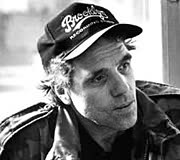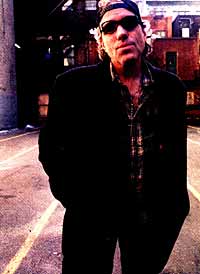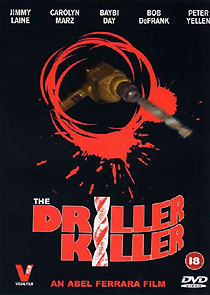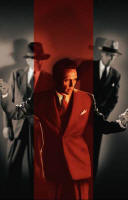| ABEL FERRARA: The Sex & Guts Interview
Part One
By Gene Gregorits with Lainie Speiser
Part
One: Abel Ferrara's apartment. Greenwich Village, NYC
GENE
GREGORITS: Wow, it's truly an honor to meet you. I love your movies.
 ABEL FERRARA: Come on in.
You want something to eat? ABEL FERRARA: Come on in.
You want something to eat?
GG:
Yeah.
NANCY
FERRARA: Hi.
GG:
Hello! Hey, you were great in Dangerous Game.
NF:
(laughs) Thank you.
AB:
Yeah, these are all the same kind of blue collar towns.
GG:
Blue-collar towns... if you've done your time in one, you have an edge
on a lot of people. What kind of jobs did you have, before you went to
film school, and made your first film?
AF:
I worked for my father, worked for my uncles. Driving garbage trucks.
GG:
Mafia-related?
AF:
I'm basically in denial about that whole concept. But... the garbage
business was the garbage business, you know what I'm saying? There was
no competition. But it's not like there's a lotta people lookin to pick
up fuckin garbage.
GG:
I'd do it! That's more money than I've ever made!
AF:
Oh yeah, there was a lot of money. These guys owned a business, it wasn't
like... I don't know, typical shit. Worked in a factory. My uncles and
my father owned scrap metal yards. That was their business. Driving trucks.
Washing dishes in a fuckin old age home, anything I could get.
GG:
I washed dishes in an old age home once.
AF:
Yeah?
GG:
Yeah!
AF:
That was a good job. At the time. It's like you said, you were working
when you were young, so any job at that age is good. And... then there
was the driving range, picking up golf balls.
GG:
Just like James Ellroy?
AF:
Huh?
GG:
What do you think of James Ellroy? Because he was also a caddy.
AF:
What was he?
GG:
James Ellroy was a caddy.
AF:
Yeah, but bein a caddy and pickin up golf balls are two different things.
GG:
HEH HEH HEH! Yeah, I guess so. Let me check this.
GG:
What a beautiful cat. I love your cat. What kind of cat is that?
AF:
Yeah, you can write about the cat. It's just a cat in the family.
We had a grandfather and a grandmother, you know?
GG:
Yeah.
AF:
She was the only white cat in the whole litter. But she's had three or
four litters herself. She's about four years old.
GG:
Yeah, but she looks like a kitten. She's tiny. So carryin the clubs is
called a caddy. What's pickin up golf balls called?
AF:
I could never be a caddy. Carryin somebody's golf bags? Forget it. We
used to play golf, we didn't caddy.
GG:
How do your remember yourself as a kid in grade school and junior high?
AF:
(long pause) It was so different from grade to grade. Some grades you
were like the man, and you were in control, and you were like,
in a good place in terms of where you were at. Different school, it would
be a different situation. I guess it was tough, I don't know. We were
like... evil bored. You know what I mean? This was a town that my writer
Nicky [St. John] came from, and Mel Gibson came from. Tommy Boyle, the
writer. You know the fuckin guy.
different situation. I guess it was tough, I don't know. We were
like... evil bored. You know what I mean? This was a town that my writer
Nicky [St. John] came from, and Mel Gibson came from. Tommy Boyle, the
writer. You know the fuckin guy.
GG:
Sorry.
AF:
He just wrote a film. He did that movie about that health spa in the forties.
You know the fuckin guy. He just had a book out about a commune in California
that moved to Alaska. You should look this guy up. He wrote great American
novels. He's like the great American writer. T. Courigessant Boyle.
Imagine, coming from the same town as the great American writer.
GG:
What were your aspirations, and what were you interested in as a teenager?
Movies you liked, stuff like that. Who was Abel Ferrara at the
age of 14.
AF:
Well, I come from the Bronx. My mother was very into instant breakfast,
the latest this and the latest that. TV dinners. Being in
a modern suburban world. But my father was from an old Italian family
in the Bronx. Steeped in tradition. Very much an outsider in a white world,
you know what I'm sayin.
NF:
He wants to know if number two is okay?
AF:
Yeah, tell him... tell him I'm doin this thing. One or two is perfect.
AF:
Yeah, it was an age when... you know, we were playin music. We were into
rock'n'roll. In the sixties... .look, Spielberg made a 2-hour feature
when he was thirteen years old. It played at this local theatre. He's
basically my age. Guys from that generation... even though it's a shame
we didn't have the video, and the digital fuckin trip goin, but we had
home movie cameras. Actually makin a film, and cutting pieces of film
together, was at the time very much as obvious or accessible as playin
a guitar. So... when you find your fuckin calling, you got it, you know
what I'm saying?
GG:
When you flash forward in your career, and look at the fact that many
of your films end in either suicide or mass murder (laughs)... I mean,
these films are about extremely self-destructive people. Does that tie
into anything you experienced as a kid? Where do you think you acquired
such a dark sensibility? There has to be a reason why you tell those
stories as opposed to other stories.
AF:
Well...
GG:
Because they're not the most commercially viable films, yet you insist
on making them, in the way you're going, always going into the
dark human stuff.
AF:
If you weren't conning yourself into approaching filmmaking as
a commercial deal...
GG:
Trying to tell real stories...
AF:
Yeah. If you're doing that... we were watching a lot of films.
We saw Hour of the Wolf. We saw Teorama, you know?
GG:
Bergman, Fellini.
AF:
Pasolini. Yeah. back then, those were some hardcore films. Fat
City. There's a certain time when you're really into watching movies.
Now, I am not big on movies. But then... you saw everything
for a certain period. '71, '72, '73... that was the golden age of movies,
for me. The Devils. The Servant. Nicholas Rey. Alphaville.
Performance. And Mean Streets.
GG:
Did The Wild Bunch influence you?
AF:
To me, Straw Dogs was a bigger influence. The Wild Bunch
always seemed like a classical film. I didn't see it in the theatres.
I saw Straw Dogs in the theatre.
GG:
So the meanness of those films almost became your main frame of reference.
But as a kid...
AF:
It was the sixties, before that stuff. Drinkin and druggin. Sex, drugs,
and rock'n'roll, whether you could get 'em or not. That basically dominated
your entire existence.
GG:
When you had your first idea to do a film... coming from your background,
what you'd lived and seen... what was your idea of a movie that
you would make?
AF:
We were makin movies based on the equipment we had. We were making four
and five minute silent movies... that were much more metaphorical and
pseudo-intellectual. We  couldn't use, and couldn't getsync
sound. We couldn't get dialogue, which really bummed us out. But in fact,
it helped us in that it taught us how to work without sound. couldn't use, and couldn't getsync
sound. We couldn't get dialogue, which really bummed us out. But in fact,
it helped us in that it taught us how to work without sound.
GG:
Your first feature, Driller Killer...
AF:
We were makin films for ten years before we made Driller Killer.
Our first films were 2 or 3 minutes.
GG:
I know Nico from Cult Epics, and he was telling me about certain short
films you'd made... what can you tell me about the short films? One of
them has the word "love" in the title.
AF:
Could This Be Love? That was 1973. But we made a porno film before
Driller Killer.
GG:
Nine Lives of a Wet Pussycat.
AF:
Yeah, right. Could This Be Love?, I guess we should have made that
into a feature film. That was a romantic comedy.
GG:
Were you the director on Nine Lives?
AF:
I've never done anything but direct.
GG:
That's a hard film to see. I haven't seen it. From what I've heard, there
is some violence in it, stabbings and knifings and things like
that.
AF:
They're not in it! I've gotten tapes made from prints from the old days,
and back in those days, when a print went around, the projectionist would
keep his favorite scenes. After a few trips around the country, the only
thing left was the bad scenes.
GG:
(laughing)
AF:
And look man, I've got kids, so I'm not about to broadcast the
fact that we were doin hardcore films, but it's also the fact that they
weren't that good to begin with. We were still learning to make movies.
The few good things we did manage to finish don't exist anymore.
GG:
What about Driller Killer? I'm very interested in the origins of
the script, where the idea came from. How you developed it.
AF:
We went to Stan Brakhage and guys like that, as much as we did other films.
Short 16mm films, spaced out stuff at the time. We were trying to do that
and goin nowhere.
GG:
Is this at NYU?
AF:
No, we never went to NYU. We were out of school at this time. We were
like 26, 27. Totally out there, without a net. Nothing happening. Nothin
looked like it was gonna happen.
GG:
How would you describe what New York was to you at that time?
AF:
Violent and broke. It was fear city. Taxi Driver gets it.
That's what it was about.
GG:
It seems as if Taxi Driver played a vital role in the inception
of Driller Killer. What did that film mean to you?
AF:
Well, that was The Movie! That's what we were workin off of!
GG:
That is, to me, the best movie of that decade. Or of that maverick
period. I like that film more than Bonnie and Clyde, more than
The Wild Bunch. It's intensely personal and real and tragic. In
fact, I think it's one of the top five greatest movies ever made.
AF:
Yeah. Mean Streets was great.
GG:
Yeah but Taxi Driver was so much more personal. I like personal
films.
AF:
Well, that was Paul Schrader. With Taxi Driver, you see much more
of that dynamic between screenwriter, actor, and director.
GG:
There are a lot of parallels between you and Paul Schrader. Schrader,
like you, tells dramatically
negative stories about people who are on their way out, a lot of
the time. He's made a career out of that. He makes the occasional film
which covers other territory, and so do you. But he made Cat People.
You made Cat Chaser. Ha ha ha. But he is very interested in people
that are dying. dramatically
negative stories about people who are on their way out, a lot of
the time. He's made a career out of that. He makes the occasional film
which covers other territory, and so do you. But he made Cat People.
You made Cat Chaser. Ha ha ha. But he is very interested in people
that are dying.
AF:
Well, Nicky St. John wrote these films of mine. So I would say that that
connects more to him. It's an intellectual...
GG:
- existentialism, really! Nicky is a guy who is very obsessed with Catholicism
and Catholic imagery in general.
AF:
He's not obsessed with it, he's just a believer in the words of
Christ, do you know what I'm sayin?
GG:
That defines much of your career. I could be wrong, but I think that the
majority of your films were written by him, and -
AF:
- we stopped working in 1997.
GG:
Why did you stop working together?
AF:
He had just reached a point in his life where the whole thing of the
business just wasn't satisfying him anymore. He just wasn't into it.
GG:
There's this new movie about Rockets Redglare which is incredibly powerful.
Did you know Rockets Redglare?
AF:
Yeah. I remember. I knew that he was friends with the girl who was in
Driller Killer. The blonde haired chick.
GG:
Seems like Rockets was friends with everybody, at one point or another.
(laughs)
AF:
There was a guy named Neon Leon.
GG:
He was involved in the Sid Vicious murder case.
AF:
And Dee Dee Ramone. That was New York. 1978. The music started
getting a lot better. We were making films.
GG:
That was when you did Driller Killer. The punk scene was exploding
at that time.
AF:
Rock'n'roll really helped the whole film situation.
GG:
Were you aware, at the time, that you were making a film that would be
marketed as an exploitation film?
AF:
We raised the money that way! We went around with Texas Chainsaw,
saying basically, "I think we could do this." We've been makin
films for ten years, right? That's one of my favorite films too, for some
reason.
GG:
Again, I think Texas Chainsaw is one of the greatest films of all
time!
AF:
Ah ha ha ha ha ha!
GG:
It's cheap, but it's amazing.
AF:
We have very clich | 
